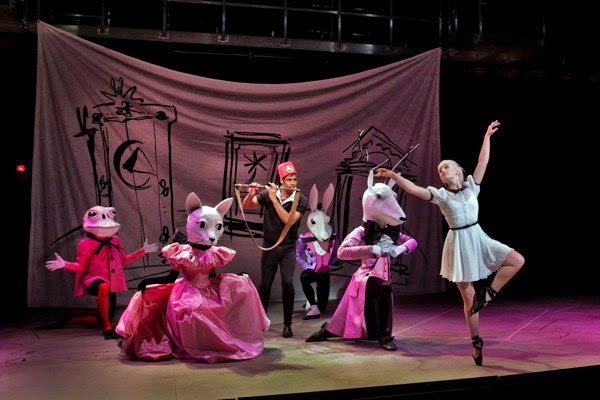 |
| (L to R) Opera Theatre’s chorus, Lindsey Jones as Isis, and Dwayne Brown as Osiris in Opera Theatre of Saint Louis’ 2014 production of The Magic Flute. Photo © Ken Howard, 2014. |
Written towards the end of the composer's sadly brief life (Mozart had only a few months to live when it premiered in September of 1791), “The Magic Flute” was intended not for an audience of nobles at court but rather for ordinary folks at a suburban theater that was closer in ambience to a tavern. A singspiel with spoken dialog instead of recitatives and a text in German instead of the fashionable Italian, the work is the fantastic tale of heroic prince Tamino and princess Pamina, daughter of the Queen of the Night, who must undergo a series of magical trials at the court of Sarastro, High Priest of the Sun, before they can attain enlightenment and be united in marriage. Accompanying Tamino in his quest is the comic bird catcher Papageno.
The work's fanciful setting and Masonic symbolism—both Mozart and his librettist Emanuel Schikaneder (the first Papageno) were members of the same lodge—have always given directors and designers ample opportunities to indulge their imaginations. Mr. Mizrahi has taken classic films as his inspiration, placing the opera on "an eternal Hollywood soundstage" and incorporating visual elements from famous movies. Thus, for example, Tamino's black and white outfit strongly echoes that of Gene Kelly in "An American in Paris," while the Three Spirits that assist Tamino, normally played by young boys, are sung here by a trio of young women decked out as toddlers and walking on their knees as in the "Triplets" number from "The Band Wagon." Papageno looks like a classic baggy pants comic, his future mate Papagena is an archetypical chorus girl, and the Queen of the Night appears to be inspired by Gloria Swanson's Norma Desmond in "Sunset Boulevard."
 |
| Photo: Ken Howard |
Scenes in Sarastro's Temple of the Sun are equally impressive, as Mr. Mizrahi fills the stage with Shriners in red fezzes and sports coats, colorful dancing birds, and even dancing statues of Isis and Osiris.
Mr. Mizrahi has, in short, allowed his fertile imagination to give us an almost constant procession of color and movement. And that, ultimately, is the problem. Because far too often that movement pulls focus from the singers and dilutes the impact of their generally fine work. This is especially true when, early in the first act, Mr. Mizrahi begins adding dancers to the mix who shadow the singers in identical costumes and mirror in dance what they're singing. John Heginbotham's 1950s film musical–style choreography is very effective and beautifully performed, but it's also extremely distracting and has the effect, more often than not, of upstaging the singers.
That's a pity, since the cast of this "Magic Flute" is generally a good one. Tenor Sean Panikkar, last seen as Lensky in OTSL's fine "Eugene Onegin" in 2010, is pretty much an ideal Tamino, with a uniformly strong voice and solid acting skills. Baritone Levi Hernandez brings the same finely honed comic sense and crystal-clear diction to Papageno that he brought to Leporello in "Don Giovanni" two seasons ago.
 |
| Photo: Ken Howard |
Tenor Matthew DiBattista, who has graced the OTSL stage with so many fine performances in the past, delivers yet another as the villainous Monostatos, whose lustful intentions towards Pamina are repeatedly thwarted to comic effect.
Bass Matthew Anchel's Sarastro is a bit of a disappointment. A bass's very low notes are always difficult to project (and Sarastro's part goes very low in places), but even so his voice seemed to lack power throughout its range and his character came across as stilted. That might be deliberate—Mr. Mizrahi has indicated that his sympathies are more with the Queen of the Night than with Sarastro—but if that's the case I don't think it's an effective choice.
There's noteworthy work here as well in all the minor roles, all the way down to tenor Frederick Ballentine and bass-baritone Zachary Owen as the Two Armed Men, smoothly delivering their "purification" chorale prelude before Tamino and Pamina's trials by fire and water.
 |
| Photo: Ken Howard |
Speaking of which: I have a dream that some day I'll see an opera on the Loretto Hilton stage in which the overture will not be accompanied by lots of noisy stage business. One can but hope.
In a review of Robert Lepage's Ring cycle at the Met in 2011, New York Times critic Charles Isherwood noted that “the first responsibility of the director should be serving the musical drama,” and went on to describe a production that “seems to be perpetually in competition for our attention with the opera itself.” I wouldn't go quite that far with Mr. Mizrahi's "Magic Flute" since, the dancers aside, his staging generally clarifies and enhances the opera overall, but it does often feel as though he's doing his level best to distract us with flash and glitter. I think this production, thought generally successful, could have been much better had it been much simpler.
Opera Theatre of St. Louis's "The Magic Flute" runs through June 28th in rotating repertory with three other operas. To get the full festival experience, come early and have a picnic supper on the lawn or under the refreshment tent. You can bring your own food or purchase a gourmet supper in advance from Ces and Judy's. Drinks are available on site as well, or you can bring your own. For more information: experienceopera.org.
This review originally appeared at 88.1 KDHX, where Chuck Lavazzi is the senior performing arts critic.
